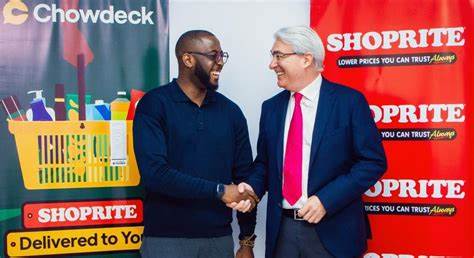Chowdeck, based in Lagos, is sponsored by Y Combinator and has raised $2.5 million in venture funding.
Choedeck seeks to imprint in a field that has burnt titans such as Jumia and Bolt by aiming to expand food delivery in a challenging market.
According to official figures, Nigerians value food, with households spending about 60% of their income on it, the highest rate worldwide. This great affection for food and increased internet purchasing positions Nigeria’s food delivery business to reach $2 billion to $3 billion by 2032.
Chowdeck, founded by Femi Aluko, Olumide Ojo, and Lanre Yusuf, allows customers to order food and have it delivered to their door in less than 30 minutes on average. CEO Aluko stated that his idea for founding the organization sprang from his experience with speedy deliveries and excellent customer service while on a business trip to Dubai.
Aluko explained,
“Ordering food in Nigeria typically takes one or two hours. However, during my three-month stay in Dubai, I consistently received my food orders on time. If there were any delays, the restaurant would contact me and apologize. It was stunning to watch, and I wondered if we could match that level of service in Nigeria.”
In the first half of 2023, Nigerians spent over ₦60 trillion on food and home supplies, according to the country’s official statistics office.
Aluko and his co-founders tested the concept with a few bikes and partnered with two restaurants. After improving their strategy, they formally introduced the initial version of the product in October 2021. Since then, the platform has grown significantly, with over 3,000 riders and over 500,000 users (Aluko claims that over 100,000 people utilize the site each month).

Less competition means more growth
Chowdeck’s fantastic growth is evident, particularly in a competitive sector where big rivals such as Jumia Food and Bolt Food already had a strong presence with thousands of consumers at the time of introduction.
Furthermore, given the industry’s reputation for narrow profit margins and infrastructural issues such as traffic and inadequate roads, which cause delivery delays, the main question was how Chowdeck intended to overcome these challenges and carve out its position.
Later, participants in a market benefit from the experiences of earlier players. Unlike its predecessors, Chowdeck understood the value of sustaining positive unit economics from the start. While other meal delivery platforms frequently relied on significant discounts, Chowdeck took a different strategy, refining its business model to ensure sustainability by reducing discounts and only delivering them on behalf of its partner restaurants when essential.
“We took the time to figure out the right economics for our delivery business, which is why we’re not big on offering unrealistic discounts,” noted Aluko, a former chief engineer at Stripe subsidiary Paystack. “This approach kept us focused on selling and targeting the right customers rather than trying to capture everyone, which could’ve compromised our economics and marketing strategies.“
By the end of 2023, Jumia Food and Bolt Food had left the Nigerian market for various commercial reasons, leaving Glovo as Chowdeck’s primary competitor. Both withdrawals contributed to Chowdeck’s nearly twofold user growth over the last six months.
We are prioritizing convenience
Aluko emphasizes that Chowdeck’s appeal stems from its convenience. While not always the most cost-effective choice, he stressed that Chowdeck caters to consumers who value time and are prepared to pay for quick deliveries.
The startup’s delivery system is based on geotagging, providing various vehicle options ranging from bicycles to motorcycles and enforcing rigorous controls on vendors and riders. (For example, vendors must accept orders within a five-minute timeframe; failing to do so results in order cancellation and decreased priority for the seller.)
Similarly, Chowdeck uses automated methods to streamline customer-rider connections, relying on internal data for daily demand predictions and supply evaluation. If an average rider makes eight deliveries per day and the platform predicts 10,000 deliveries, at least 1,250 riders must be accessible on that day.
Chowdeck’s logistics model benefits small food vendors, major quick-service restaurants like Burger King and Chicken Republic, and supermarkets like ShopRite and pharmacies. The startup, which operates in eight cities, has learned from its flagship business and launched delivery services in the supermarket/grocery and pharmacy verticals. In 2023, Chowdeck had over 1,500 active suppliers across three verticals, and it also launched a relay service for intra-city package movement in Lagos.
Rider’s earnings
Last year, the platform’s yearly gross merchandise value (GMV) for these verticals exceeded ₦7 billion ($5.8 million). In October, it surpassed the ₦1 billion ($830,000) threshold for the first time. By March 2024, it had increased the money to ₦2.4 billion ($2 million). Lagos accounts for 80% of Chowdeck’s volume, with the remaining 20% coming from other cities, including Abuja, Port Harcourt, Ibadan, Benin City, Ilorin, Abeokuta, and Asaba.
According to Aluko, Chowdeck, which has a 24% take rate, saw its revenue from vendor commissions, service fees, surge charges, and delivery costs climb by 1,200% between 2022 and 2023.
As a rapidly expanding company, Chowdeck plans to use the freshly generated funds to increase operational efficiency and expand its presence to more locations in Nigeria. However, the on-demand delivery service is also committed to using the investment to improve the experience for its customers, merchants, and, in particular, delivery riders, whose earnings currently surpass three to five times Nigeria’s monthly minimum wage, Aluko explained.
“After a few months of building Chowdeck, it was clear the level of impact we were going to have and teething problems we could solve at scale in the country, especially around earnings,” Aluko said. “For many people, including us, it was interesting to see our riders getting paid between ₦100,000-200,000 monthly ($83-$170) regularly and profitably.”
Notable investors in the seed round included YC, Goodwater Capital, FounderX Ventures, HoaQ Fund, Levare Ventures, True Culture Funds, and Haleakala Ventures. Founders include Simon Borrero and Juan Pablo Ortega (of Rappi), Shola Akinlade, and Ezra Olubi (of Paystack) have also joined the investor roster.



